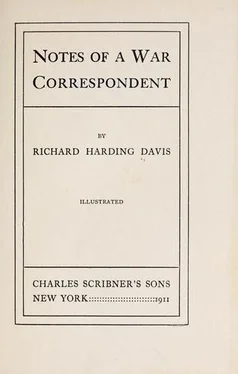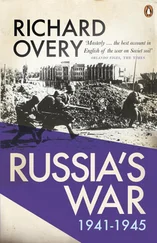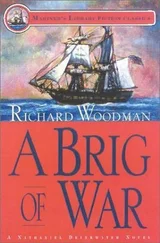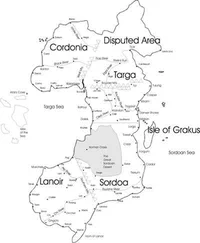Richard Davis - Notes of a War Correspondent
Здесь есть возможность читать онлайн «Richard Davis - Notes of a War Correspondent» весь текст электронной книги совершенно бесплатно (целиком полную версию без сокращений). В некоторых случаях можно слушать аудио, скачать через торрент в формате fb2 и присутствует краткое содержание. Город: New York, Год выпуска: 1911, Издательство: Charles Scribner’s Sons, Жанр: Публицистика, prose_military, на английском языке. Описание произведения, (предисловие) а так же отзывы посетителей доступны на портале библиотеки ЛибКат.
- Название:Notes of a War Correspondent
- Автор:
- Издательство:Charles Scribner’s Sons
- Жанр:
- Год:1911
- Город:New York
- ISBN:нет данных
- Рейтинг книги:5 / 5. Голосов: 1
-
Избранное:Добавить в избранное
- Отзывы:
-
Ваша оценка:
- 100
- 1
- 2
- 3
- 4
- 5
Notes of a War Correspondent: краткое содержание, описание и аннотация
Предлагаем к чтению аннотацию, описание, краткое содержание или предисловие (зависит от того, что написал сам автор книги «Notes of a War Correspondent»). Если вы не нашли необходимую информацию о книге — напишите в комментариях, мы постараемся отыскать её.
Summary by Neeru Iyer
Notes of a War Correspondent — читать онлайн бесплатно полную книгу (весь текст) целиком
Ниже представлен текст книги, разбитый по страницам. Система сохранения места последней прочитанной страницы, позволяет с удобством читать онлайн бесплатно книгу «Notes of a War Correspondent», без необходимости каждый раз заново искать на чём Вы остановились. Поставьте закладку, и сможете в любой момент перейти на страницу, на которой закончили чтение.
Интервал:
Закладка:
Sir Harry Johnson, in his advice to explorers, makes a great point of their packing a chair. But he recommends one known as the “Wellington,” which is a cane-bottomed affair, heavy and cumbersome. Dr. Harford, the instructor in outfit for the Royal Geographical Society, recommends a steamer-chair, because it can be used on shipboard and “can be easily carried afterward.” If there be anything less easy to carry than a deck-chair I have not met it. One might as soon think of packing a folding step-ladder. But if he has the transport, the man who packs any reasonably light folding chair will not regret it.
As a rule, a cooking kit is built like every other cooking kit in that the utensils for cooking are carried in the same pot that is used for boiling the water, and the top of the pot turns itself into a frying-pan. For eight years I always have used the same kind of cooking kit, so I cannot speak of others with knowledge; but I have always looked with envious eyes at the Preston cooking kit and water-bottle. Why it has not already been adopted by every army I do not understand, for in no army have I seen a kit as compact or as light, or one that combines as many useful articles and takes up as little room. It is the invention of Captain Guy H. Preston, Thirteenth Cavalry, and can be purchased at any military outfitter’s.
The cooking kit I carry is, or was, in use in the German army. It is made of aluminum,—weighs about as much as a cigarette-case, and takes up as little room as would a high hat. It is a frying-pan and coffee-pot combined. From the Germans it has been borrowed by the Japanese, and one smaller than mine, but of the same pattern, is part of the equipment of each Japanese soldier. On a day’s march there are three things a man must carry: his water-bottle, his food, which, with the soldier, is generally carried in a haversack, and his cooking kit. Preston has succeeded most ingeniously in combining the water-bottle and the cooking kit, and I believe by cutting his water-bottle in half, he can make room in his coffee-pot for the food. If he will do this, he will solve the problem of carrying water, food, and the utensils for cooking the food and for boiling the water in one receptacle, which can be carried from the shoulder by a single strap. The alteration I have made for my own use in Captain Preston’s water-bottle enables me to carry in the coffee-pot one day’s rations of bacon, coffee, and biscuit.
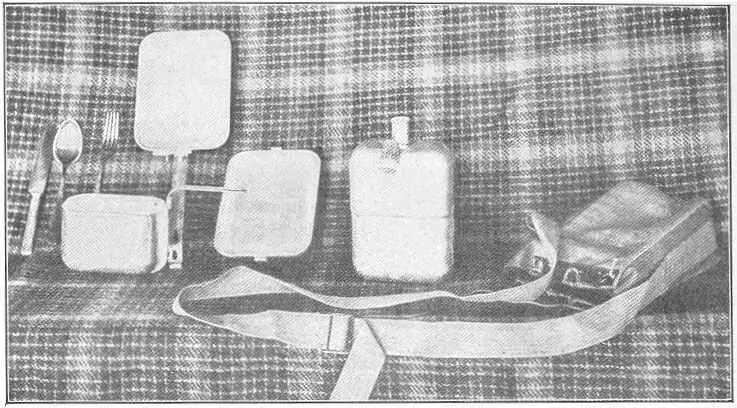
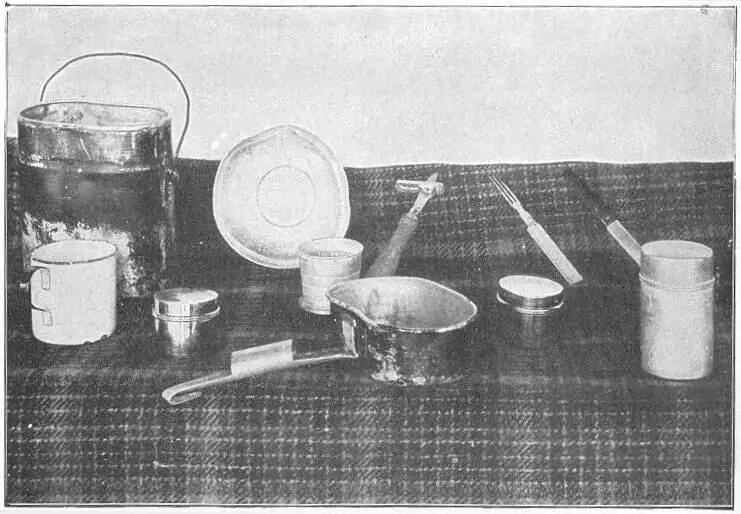
In Tokio, before leaving for Manchuria, General Fukushima asked me to bring my entire outfit to the office of the General Staff. I spread it out on the floor, and with unerring accuracy he selected from it the three articles of greatest value. They were the Gold Medal cot, the Elliott chair, and Preston’s water-bottle. He asked if he could borrow these, and, understanding that he wanted to copy them for his own use, and supposing that if he used them, he would, of course, make some restitution to the officers who had invented them, I foolishly loaned them to him. Later, he issued them in numbers to the General Staff. As I felt, in a manner, responsible, I wrote to the Secretary of War, saying I was sure the Japanese army did not wish to benefit by these inventions without making some acknowledgment or return to the inventors. But the Japanese War Office could not see the point I tried to make, and the General Staff wrote a letter in reply asking why I had not directed my communication to General Fukushima, as it was not the Secretary of War, but he, who had taken the articles. The fact that they were being issued without any return being made, did not interest them. They passed cheerfully over the fact that the articles had been stolen, and were indignant, not because I had accused a Japanese general of pilfering, but because I had accused the wrong general. The letter was so insolent that I went to the General Staff Office and explained that the officer who wrote it, must withdraw it, and apologize for it. Both of which things he did. In case the gentlemen whose inventions were “borrowed” might, if they wished, take further steps in the matter, I sent the documents in the case, with the exception of the letter which was withdrawn, to the chief of the General Staff in the United States and in England.
In importance after the bed, cooking kit, and chair, I would place these articles:
• Two collapsible water-buckets of rubber or canvas.
• Two collapsible brass lanterns, with extra isinglass sides.
• Two boxes of sick-room candles.
• One dozen boxes of safety matches.
• One axe. The best I have seen is the Marble Safety Axe, made at Gladstone, Mich. You can carry it in your hip-pocket, and you can cut down a tree with it.
• One medicine case containing quinine, calomel, and Sun Cholera Mixture in tablets.
• Toilet-case for razors, tooth-powder, brushes, and paper.
• Folding bath-tub of rubber in rubber case. These are manufactured to fold into a space little larger than a cigar-box.
• Two towels old, and soft.
• Three cakes of soap.
• One Jaeger blanket.
• One mosquito head-bag.
• One extra pair of shoes, old and comfortable.
• One extra pair of riding-breeches.
• One extra pair of gaiters. The former regulation army gaiter of canvas, laced, rolls up in a small compass and weighs but little.
• One flannel shirt. Gray least shows the dust.
• Two pairs of drawers. For riding, the best are those of silk.
• Two undershirts, balbriggan or woollen.
• Three pairs of woollen socks.
• Two linen handkerchiefs, large enough, if needed, to tie around the throat and protect the back of the neck.
• One pair of pajamas, woollen, not linen.
• One housewife.
• Two briarwood pipes.
• Six bags of smoking tobacco; Durham or Seal of North Carolina pack easily.
• One pad of writing paper.
• One fountain pen, self-filling .
• One bottle of ink, with screw top, held tight by a spring.
• One dozen linen envelopes.
• Stamps, wrapped in oil-silk with mucilage side next to the silk.
• One stick sealing-wax. In tropical countries mucilage on the flap of envelopes sticks to everything except the envelope.
• One dozen elastic bands of the largest size. In packing they help to compress articles like clothing into the smallest possible compass and in many other ways will be found very useful.
• One pack of playing-cards.
• Books.
• One revolver and six cartridges.
The reason for most of these articles is obvious. Some of them may need a word of recommendation. I place the water-buckets first in the list for the reason that I have found them one of my most valuable assets. With one, as soon as you halt, instead of waiting for your turn at the well or water-hole, you can carry water to your horse, and one of them once filled and set in the shelter of the tent, later saves you many steps. It also can be used as a nose-bag, and to carry fodder. I recommend the brass folding lantern, because those I have tried of tin or aluminum have invariably broken. A lantern is an absolute necessity. When before daylight you break camp, or hurry out in a wind storm to struggle with flying tent-pegs, or when at night you wish to read or play cards, a lantern with a stout frame and steady light is indispensable. The original cost of the sick-room candles is more than that of ordinary candles, but they burn longer, are brighter, and take up much less room. To protect them and the matches from dampness, or the sun, it is well to carry them in a rubber sponge-bag. Any one who has forgotten to pack a towel will not need to be advised to take two. An old sergeant of Troop G, Third Cavalry, once told me that if he had to throw away everything he carried in his roll but one article, he would save his towel. And he was not a particularly fastidious sergeant either, but he preferred a damp towel in his roll to damp clothes on his back. Every man knows the dreary halts in camp when the rain pours outside, or the regiment is held in reserve. For times like these a pack of cards or a book is worth carrying, even if it weighs as much as the plates from which it was printed. At present it is easy to obtain all of the modern classics in volumes small enough to go into the coat-pocket. In Japan, before starting for China, we divided up among the correspondents Thomas Nelson & Sons’ and Doubleday, Page & Co.’s pocket editions of Dickens, Thackeray, and Lever, and as most of our time in Manchuria was spent locked up in compounds, they proved a great blessing.
Читать дальшеИнтервал:
Закладка:
Похожие книги на «Notes of a War Correspondent»
Представляем Вашему вниманию похожие книги на «Notes of a War Correspondent» списком для выбора. Мы отобрали схожую по названию и смыслу литературу в надежде предоставить читателям больше вариантов отыскать новые, интересные, ещё непрочитанные произведения.
Обсуждение, отзывы о книге «Notes of a War Correspondent» и просто собственные мнения читателей. Оставьте ваши комментарии, напишите, что Вы думаете о произведении, его смысле или главных героях. Укажите что конкретно понравилось, а что нет, и почему Вы так считаете.
